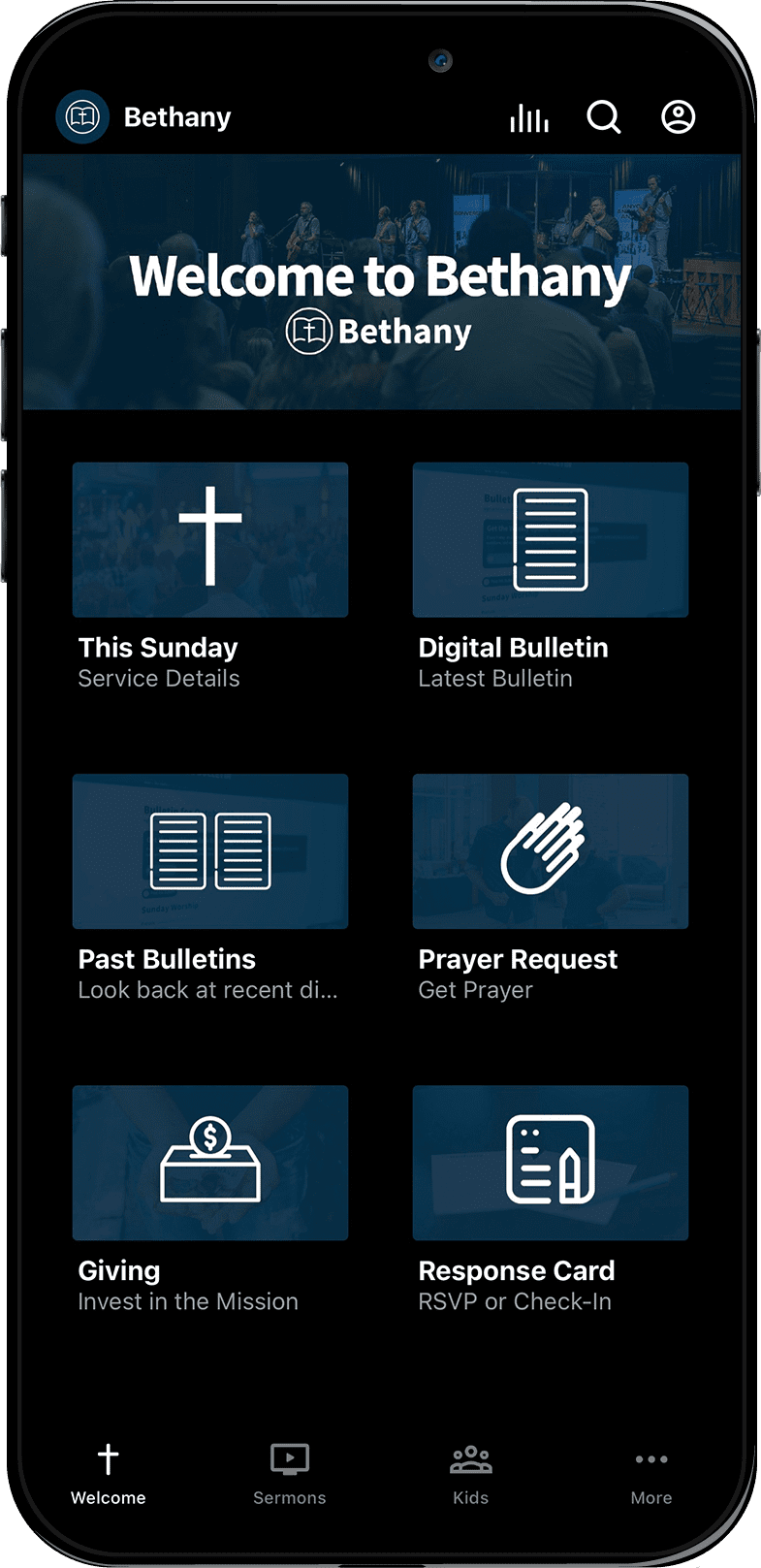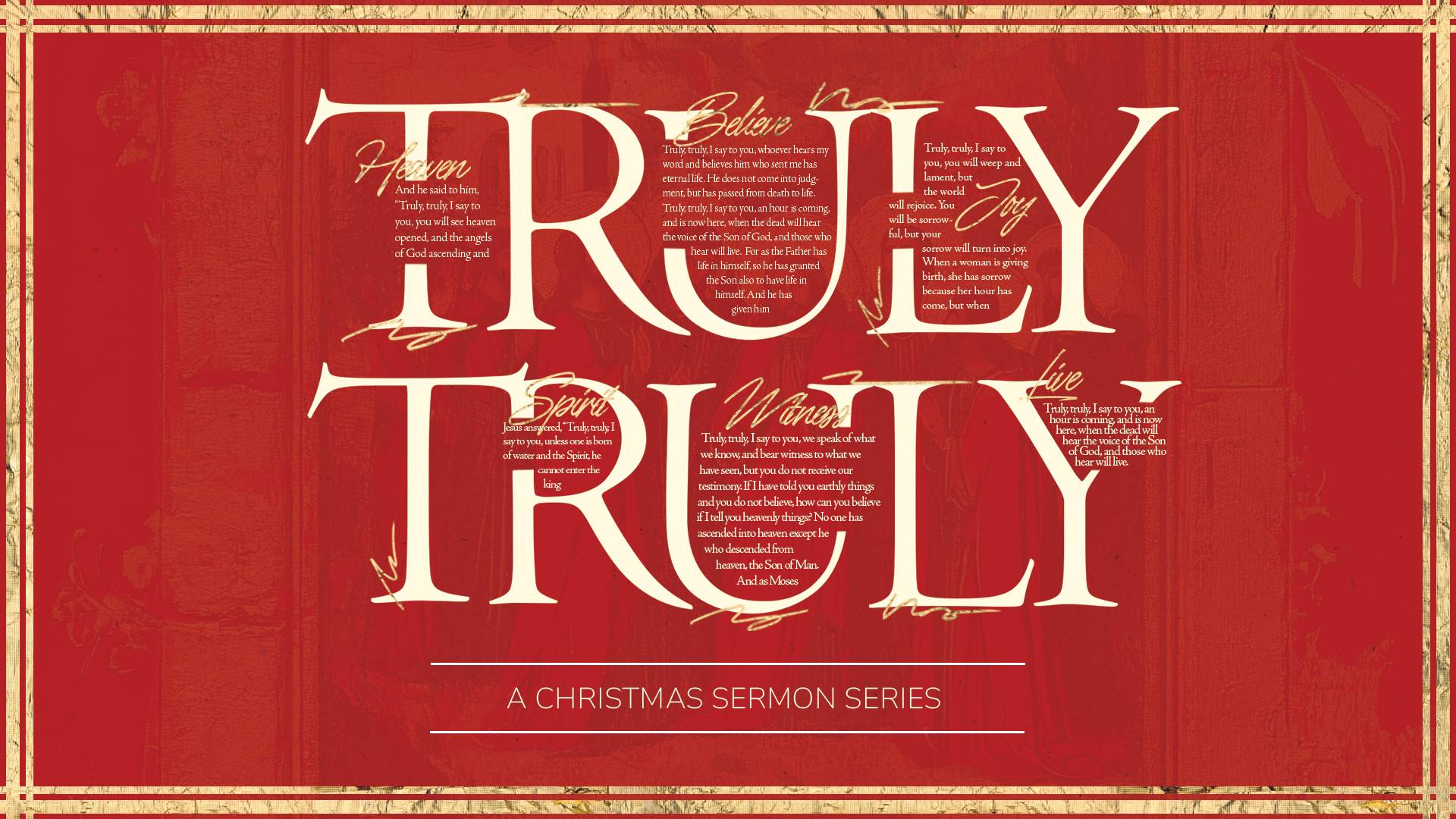In This Series
A Peace-Making Community
Romans 12:17-21 (ESV)
September 11 2022
Dr Ritch Boerckel
We’re going to be in Romans 12. We are at the tail end of our series entitled Community in Action: I’m In! During this series, we’ve been encouraging everyone in our church to consider being involved in a community group. Outside of the Sunday morning service, it’s the first place where we believe we can effectively help you to grow as disciples of Christ, where we can follow Jesus together, where we can do His mission. I know perhaps for some of you there is some reticence to that and even some discouragement from the past. But I would urge you and encourage you to continue to pray over whether God would have you to connect to a community group. We believe that God will use you in that group and then use the group in your life for really sweet encouragement and help and growth. We’re going to be looking at Romans 12:14-21. This Scripture teaches us how to love as a response of worship to God and how to love in a context where we are wronged, where we are hurt.
14 Bless those who persecute you; bless and do not curse them. 15 Rejoice with those who rejoice, weep with those who weep. 16 Live in harmony with one another. Do not be haughty, but associate with the lowly. Never be wise in your own sight. 17 Repay no one evil for evil, but give thought to do what is honorable in the sight of all. 18 If possible, so far as it depends on you, live peaceably with all. 19 Beloved, never avenge yourselves, but leave it to the wrath of God, for it is written, “Vengeance is mine, I will repay, says the Lord.” 20 To the contrary, “if your enemy is hungry, feed him; if he is thirsty, give him something to drink; for by so doing you will heap burning coals on his head.” 21 Do not be overcome by evil, but overcome evil with good.
May God encourage us through the reading of His Word today!
The Apostle Paul says to a young pastor Timothy,
1 Timothy 1:5 NAS95 But the goal of our instruction is love from a pure heart
He says you wrap up everything that I am teaching you related to doctrine, and the whole goal is love. It is first love upward toward God and then love outward within the church, among brothers and sisters, to represent God’s family to a world that doesn’t know God. We have chosen to preach our recent series entitled Community in Action with the very goal of increasing love among one another here in this specific church family. I would ask that you would continue to pray that God would shape you to become a member of your church family who loves your brothers and sisters in a way that causes our church to be a family of love. I would encourage you to pray that God would work in you because any corporate change begins within each one of our own hearts.
One problem with preaching a series like this is that most of us consider ourselves doing fairly well in the love department. If I were to ask you to name one area in your life where you would like to grow spiritually, some of you right away would mention spiritual disciplines. “I could pray more. I could read the Bible more.” Others of you might mention family issues like “As a family, we need to have more family devotions and get together as a family and sit before God and worship Him together.” Others of you might relate to missional struggles like, “I need to witness. I need to share the Gospel more. I don’t think my neighbors have ever heard me tell them about Jesus. God set me in my neighborhood to tell them about Christ.” Others might list some very specific sin habits perhaps related to anger or to lust. But if we were to write one area where we would desire the most for God to grow us, I think very few of us would write down, “I need to love my brothers and sisters in my own church more. That’s what I need God to do.” Yet this is predominant all throughout the pages of Scripture. This issue of loving God and then loving one another is central to everything else that God is doing in us and through us.
So if we are so frequently self-deceived by the evaluation of our own hearts regarding love, how can we know, how can we diagnose our growth in love? Well, I’ve thought about in this series five specific symptoms that I think are drawn from these beautiful verses where God is describing the heart of love for one another all throughout chapter 12. The first symptom that I see here is an open heart. It’s right for us to ask: Is my heart opening or closing on the people whom God sets in front of me? Do I look for ways to build new relationships or to avoid new relationships? An open heart is willing to let God add one more person to an already crowded dance card.
Second, I thought of a broad heart. It’s right for us to ask: Do I like and esteem a narrow group of people or do I esteem and like a broad group of people? Our world teaches us to be rather selective about whom we let into our life. Love, however, breaks open the door of our hearts to befriend every kind of person; the cool and the nerdy, the rich and the poor, the funny and the serious, the old and the young, the refined and the sloppy, the winners and the losers. Let me ask you, do you find that God has allowed you to establish a relationship with a broad group of people? That’s what genuine love does.
The third symptom is a generous heart. It’s right for us to ask: Am I willing to give to others my time, my energy, my resources and also my very self? Love sees financial needs and sacrifices to meet them. Love sees the lonely person and offers friendship. Love sees a spiritually struggling person and stops to pray. You see, love is willing to be interrupted. Love is willing to invest whatever we have to give Jesus’ love to others.
The fourth symptom would be a persevering heart. I ask: Do any of my relationships end because I have become weary from constant disappointments? Does my fleshly desire for the fresh and new move me away from the old and the stale? Our flesh quickly retreats when relationships become hard. But love perseveres. Jesus’ love is constant. There is nothing that can ever separate us from the love which we have in Jesus Christ. Nothing at all! Never! Is my heart persevering in its love for my brothers and sisters? That reflects the heart of Jesus.
Finally, there is a forgiving heart, a gracious heart, a merciful heart. I ask: Are there people who have hurt me who still stir me up in frustration when I think of them? Am I truly at peace when I think of a wrongdoer or does my spirit jump with a dark emotion? Our flesh loves to nurse its wounds. But love turns a spirit of anger into a spirit of blessing. Rather than closing our heart to people who hurt us or who discourage us, love opens our heart and extends beyond natural boundaries to provide the grace of God as an instrument of Jesus’ feet and hands to them.
This morning, we open up our Bibles to Romans 12. We’re going to look at these verses that are so practical. I can’t tell you how many times I’ve had to turn to them in my life. The truth is we are often hurt in this world of conflict. It’s a warring world. It’s a hostile world. We’re right to expect that oftentimes that hostility will rub up against us even from unexpected people. But how are we to respond when people hurt us? Of course we’re asking that question in church, so the church answer to every question is what? How are we to respond when people hurt us? The church answer is Jesus. That’s the truth.
God would have us to be Jesus. So when people hurt us, we ask, what has Jesus done for us when we were His enemy? What did He do? Then how can Jesus build His own Spirit and character inside of me so that my responses become His responses? In every relationship, we are called to be Jesus to others. Paul begins with a call to worship because this is impossible apart from the Spirit of Christ indwelling us and then us submitting to the Spirit of Christ in worship. So that’s the reason why verses 1 and 2 of Romans 12 are sort of foundational. They are the anchor for which every other practical admonition and encouragement to love, flows in chapter 12. In verses 1 and 2, you see Paul saying
Romans 12:1 I appeal to you therefore, brothers, by the mercies of God,
God was merciful to you. God is gracious to you through Jesus. I appeal to you then
Romans 12:1 …to present your bodies as a living sacrifice,
What that simply means is that we say, “God, this body is not mine.” Every day we say, “This body is yours. Do with it what you want. I want to be Jesus’ feet and hands.” It’s only reasonable, by the way, that we would worship God in that way. When we present our bodies to God, what does God do with our bodies? He uses us to love people. He uses us to grow love within His church among brothers and sisters so that we would be encouraged in the faith, that we would grow more in Christlikeness, that we would follow Jesus together, that we would fulfill His mission together. That’s what He does. So everything we’ve talked about related to love really flows out of a commitment to worship God and to do so in a whole-life way. The idea we’re going to trace here in Romans 12, verse 14 and following is that radical worship leads us to love our enemies and to seek to do them good.
Now, before we enter into these verses which are powerful and convicting, there are a few clarifications that I want to make because I don’t want to misrepresent. Some of the statements we’re going to make could possibly lead to false conclusions. The first clarification is this passage is addressing what we are to do when someone sins against us in a hurtful way. This passage is not addressing what to do when we feel hurt, but there is no obvious sin that has taken place. This passage is to be applied when clear and present sin has taken place. As followers of Jesus, we are extremely careful not to slander others by accusing them of wrongdoing when perhaps they have not done wrong. So love demands that we do not draw evil conclusions about another’s guilt without sure evidence. I want to say that because sometimes we want to feel justified in every hurt and apply that to this passage, but that’s a different application. It’s a different sermon.
The second clarification would be that this passage does not prohibit Christ-followers from serving in the military or in law enforcement. God has established government to confront evildoers with force if necessary. In fact, Paul is going to talk about that in the very next chapter in Romans 13. This passage deals with a personal ethic. What do we do in our personal relationships when people wrong us?
Finally, this passage does not prohibit us from turning an evildoer over to the law to experience the law’s consequences. So blessing a person does not mean that we don’t take any action to hold them accountable for those actions before God and before the law. It is often a righteous option to ask government to confront those who break the law. With all that said, let’s consider four responses that God provides for us when others hurt us.
Response #1: Do not curse your enemies, but bless them.
14 Bless those who persecute you; bless and do not curse them.
The assumption of course is that we will experience people who purposefully bring misery into our lives. We shouldn’t be surprised when that happens. Again, that’s part of living in a dark world that is filled with hostility.
Let me ask you, have you ever been the object of another person’s malice or hostility? It’s a terrible and painful thing, yet we should expect to experience that in this world. Most of us suffer from what I might call soft forms of hatred. A soft form of hatred would be a word of gossip or slander, an angry curse of condemnation, a decided rejection of relationship, an intentional slight, an inexplicable act of neglect. All of these hurt! But some of God’s children suffer from harsher, more explicit forms of hatred. There might be a physical assault, a sexual abuse, a threat of murder, even imprisonment, torture or death itself. This world is consumed by influence from the evil one, who is a murderer from the beginning. He is filled with hatred. So we should expect that as we live in a world of hatred to have some of that fall upon us. There are many reasons why people might seek to harm us. Some might harm us because we love Jesus. Jesus told us to expect that. He says
Luke 21:17 You will be hated by all for my name’s sake.
Other times, people will hate us because we’re different. Our personalities, our decisions, our limitations, our talents, our skin color, our family, our successes, our failures, all these and more can rub people the wrong way. Some wars are started by the silliest of reasons. Perhaps you remember reading Jonathan Swift’s tale of Gulliver’s Travels. In that book a big conflict broke out between one group of people who broke their egg on the little end and other people who broke their egg on the big end. If you remember reading that story, it was written in satire to say this is what really actually happens in the world. A war broke out and the Lilliputians put 11,000 Big Endians to death over the issue. They called them Big Endians because they cracked their egg on the big end. We would say that’s really silly, but real wars with even more people dying have broken out over sillier matters, over less significant matters than that.
Again, this world is a world of war. It’s a world of hostility. So let’s not be shocked when others dislike us or act in ways to diminish us. I think that’s the point of Romans 12. It’s to say get ready. Be prepared for this. If we’re not prepared for that, then we won’t be Jesus in that circumstance. A lack of expectation of this kind of spiritual conflict occurring opens our hearts to Satan’s temptations to self-pity or even despair or to anger and hostility in return. So what are we to do when others turn against us? Again, here is the clear word.
14 Bless those who persecute you; bless and do not curse them.
Paul is simply repeating what Jesus has taught in the Sermon on the Mount. Jesus says
Matthew 5:43 “You have heard that it was said, ‘You shall love your neighbor and hate your enemy.’
That’s what the religious leaders said. “This is the fulfillment of the law. Love your friends. Love your neighbors, but hate your enemies. That’s okay.”
Matthew 5:44-45 But I say to you, Love your enemies and pray for those who persecute you, so that you may be sons of your Father who is in heaven.
He goes on to show how the Father loves people who defy Him and rebel against Him and even curse His name. He says
Matthew 5:45-46 …For he makes his sun rise on the evil and on the good, and sends rain on the just and on the unjust. For if you love those who love you, what reward do you have? Do not even the tax collectors do the same?
That’s the world’s kind of love. That’s not God’s love. That’s not the love of Christ in a heart. He goes on to say
Matthew 5:47-48 And if you greet only your brothers, what more are you doing than others? Do not even the Gentiles do the same? You therefore must be perfect, as your heavenly Father is perfect.
That’s where we’re all moving. That’s what one day we will experience when we see Jesus. There will be perfection. But for now, we are being perfected and He is urging us to worship God in a way that as followers of Christ, we are becoming more and more like Jesus. Our natural response to an enemy is to turn around and become an enemy to them. But Jesus says when someone decides to be your enemy, respond by acting as their friend. You see, the Scripture points to us the spiritual truth that we really only have one personal enemy that we fight. That’s the devil. It’s the devil and all of his minions. We’re right to actually hate this being and resist the devil with force. But our fight is never against the people who sin. Our fight is always against the sin that Satan tempts us toward as we respond to evil done against us. Did you catch that?
The Apostle Paul tells us in Ephesians 6 to prepare for this kind of war, this kind of readiness to respond to all kinds of temptations that Satan throws in our path. One of the strongest temptations that Satan throws is a wrong that we suffered. With that temptation, we can actually feel really righteous, but all the while, we are doing really evil, really wrong acts. We’re repeating Satan’s dark work. So he says
Ephesians 6:10-11 Finally, be strong in the Lord and in the strength of his might. Put on the whole armor of God,
Be prepared for the battle. Every day, get up and be strong in the Lord so
Ephesians 6:11-12 …that you may be able to stand against the schemes of the devil. For we do not wrestle against flesh and blood,
Our fight isn’t against these people who are doing wrong against us. They’re just instruments in Satan’s hands. Satan wants to use their evil to implant evil in us. Don’t let that happen. When you come up against evil, love those who hate you. Do good to those who wrong you.
Satan designs for the sins of others to tempt us to think and act in sinful ways toward them. Satan shouts to us, “You’re right to act in anger and malice against the person who has wronged you so. Look at what they did.” But Jesus gently says, “No, forgive. Extend mercy.” Satan says, “But that’s not fair. You’re going to be eaten alive. You won’t be able to survive.” Jesus says, “Bless and don’t curse. This is the path of life.” Satan’s strategy is to keep us constantly dwelling upon people who have wronged us. He wants us to just keep rolling this person and what they did through our mind. Satan’s strategy is to keep us ever from dwelling upon the sinfulness of our own response. He convinces us that another person’s actions are so wrong that we are right to take justice into our own hands. So how can we win this battle? Here is the beauty. Verse 14 again is so simple.
14 Bless those who persecute you; bless and do not curse them.
My flesh thinks of many, many responses that I might have to people who have hurt me. I think of sending out a zinger of an email and putting people in their place. My flesh thinks about rolling through in my mind how vile and wicked and how terrible that person is. There is some sort of fleshly pleasure in that. My flesh can even tell me to be spiritual and send a Bible verse that puts them in their place. (Laughter!) “Here is a sermon the pastor just preached. You need to listen to it.” There are all kinds of responses my flesh has when people hurt me. Blessing them is not one of them. Where would that come from? It would only come to us if the Spirit of Christ is dwelling in us, if the Spirit of Christ is controlling us and we’re yielding to Him, if we’re presenting our body to God as a living sacrifice.
I read in a commentary that the Arabs have a custom that symbolizes what I think is called for here. They touch the head and then the lips and the heart as an act of kindness toward another. What they’re saying is, “I’m going to think well of you. I’m going to speak well of you. My heart is going to be for you.” I think that’s pretty good. In essence, that’s what it means to bless. It’s thinking words and then actions and affections. How can a hurting heart have such a response? Again, it’s only through the power of Christ that dwells within us.
There are four specific blessings I believe that God calls us to give to those who hurt us. What are those? One is we can bless them by rejoicing in their successes. When good things happen we’re not like, “How come rain is falling on that person’s field? They don’t deserve it.” No, we can thank God that rain fell on their field. I’m rejoicing with them. We can bless them by mourning with them when they are hurting and genuinely being apathetic with every hurt instead of saying, “They kind of deserve it.” We can bless them by keeping a door open for relationship. We’re not going to close that door. We can bless them by refusing to think ourselves superior to them. “I’m so much better than they are.” You might say, pastor, where did you find these applications? I got these applications from verses 15 and 16.
15 Rejoice with those who rejoice, weep with those who weep. 16 Live in harmony with one another. Do not be haughty, but associate with the lowly. Never be wise in your own sight.
Response #2: Do not repay evil for evil, but consider what is honorable.
17 Repay no one evil for evil, but give thought to do what is honorable in the sight of all.
Our flesh naturally yearns to repay or to retaliate when we are wronged. We even cling to certain clichés that sound spiritual and claim to be Gospel truth. “Don’t let yourself be a doormat! Make others know that that they can’t treat you that way! Respect yourself! Stand up and fight back!” God’s Word speaks so directly and so very clearly to us. Do you find any loopholes in verse 17? I’ve looked for them. I’ve yearned for them. I’ve yearned for some loophole where repayment is actually permissible under this circumstance, and lo and behold, it’s the circumstance I’m experiencing. I’ve looked for them. Do you find any loopholes, here? I don’t.
17 Repay no one evil for evil,
In this, I think illustrations abound in Scripture. One of those is David. I think it’s so clear. David first is a young man who volunteers to challenge this giant that had just been shaming the entire army. He gains the victory. Saul then as the king is a victorious king because you have a faithful young man who believes in God and has courage. God uses him. Then Saul has some troubles. He has depression. David plays his harp and he helps Saul through all these terrible dark nights of his soul. He continues to only bless the family of Saul and what does Saul do? He gets jealous up to the point that he takes a spear and he throws it and he tries to pin David against the wall. David has to leave.
By the way, I think it’s righteous to get out of the way of a spear thrower. (Laughter!) So when it says to bless and don’t curse, it doesn’t mean we say, “Well I’m going to just stand here and let him throw spears at me.” I think David caught a clue and he said I’m not going to let that happen again. That’s not actually helping the person either. It’s not helping Saul by staying there and being a constant source of stir. So David did what was right. Sometimes it’s right to get out of the way of people who are throwing spears at us. But when we get out of the way, it’s not with an angry, “I hate you” getting out of the way and “I hope that I’m going to be able to repay you for what you’ve done to me.” That’s not what David does. What does David do?
He had two occasions where he had the opportunity to kill King Saul while King Saul was literally chasing him with a huge army of Israel all through every nook and cranny through the desert. David chooses not to take retaliation. He chooses not to repay evil for evil. In fact, in one of those cases in 1 Samuel 26, one of David’s men, Abishai, is incensed that Saul would treat David this way.
¬1 Samuel 26:8 Then Abishai said to David, “God has given your enemy into your hand this day. Now please let me pin him to the earth with one stroke of the spear, and I will not strike him twice.”
What he is saying is, “Saul is right here. I have my spear in my hand. It will only take me one quick movement. He won’t even whisper. He’ll die in his sleep. I won’t have to strike him twice. I’ll do it right.” What does David say? David said
1 Samuel 26:11 The LORD forbid that I should put my hand out against the LORD’s anointed.
I love that because he is not taking his cues from his emotions. He is not taking his cues from what is practical. He is taking his cues from the Lord. He says the Lord forbids it. This person still holds a position. I’m going to honor the Lord. That’s what Romans 12 brings us back to. It brings us back to living by faith. David had to live by faith because everything was saying and Abishai was understanding this, “This is the time to end it all and become king. This is the time, David. This is even the opportunity. Lo and behold, God has given you the opportunity.” He is even spiritualizing it. But David says, “No. The Lord has already forbidden it.” That’s why Romans 12 is so helpful to us. We see what the Lord forbids and there really is no argument. We cannot rid ourselves of our sinful desire for pay back. That’s part of our flesh. But we can overcome this sinful desire for vengeance through the grace of God in Jesus.
18 If possible, so far as it depends on you, live peaceably with all.
I love that “if possible.” God knows that peace is not always possible with some of our enemies. Jesus did not win over every one of His enemies and we will not likely win over our enemies either. I think of Judas. What did Jesus do when here is this guy He took into His inner circle? He spent so much time with him. He nurtured. He helped. This guy then betrays Him for thirty pieces of silver. He allows Jesus to grasp onto the same piece of bread while yet in the upper room. He talks with Judas, I believe, extending mercy. “Judas, there is still opportunity.” Even in the garden, when Judas approached Him, does Jesus know what Judas is approaching Him to do? Yes. Jesus could have said, “I know what you’re doing. Keep your distance! You’re not going to kiss me. I know what you’re here for. I’m Jesus, so go ahead and take me.” He doesn’t do that. He lets Judas kiss Him. He said, “Judas, would you betray me with a kiss?” Why does Jesus do that? He does that because He wants to bless Judas. “Judas, there is still opportunity for you. I’m still kind and loving and merciful. I’m still offering an opportunity.” Judas doesn’t take it. Judas is remorseful. I’m sure those words, “Do you betray me with a kiss?” cut him to the heart, but it never cut him to conviction. It cut him to remorse, but not conviction. So in despair, he committed suicide. But there is Jesus. When He was cursed, He blessed. If possible, so far as it depends on you.
In other words, we’re called to be Jesus. We’re called to do everything and to go to the nth degree. We don’t control all of the influences that lead to peace, but God says wherever we’re responsible, we are to bend every branch in our power to pursue peace. So how can we pursue peace? The list is almost endless, but I have thought of a number of them. We can always answer a harsh word with a gentle answer. We can always refuse to gossip about the person who gossips about us. We can drop any matters when we know that they’re going to lead to a fight. I don’t need to bring that subject up if I know it’s just going to end in a bad spot. We can be willing to meet with godly mediators if the other party is willing. We can say, “Yes, I’ll submit to a godly mediator.” We can forgive and we can overlook offenses. We can be generous with our time and energy and money when our enemies are in need. We can maintain an open heart to the relationship. All these I think is what it means to do what is honorable before all.
Response #3: Do not seek revenge, but seek your enemy’s welfare.
19 Beloved, never avenge yourselves, but leave it to the wrath of God,
There’s that phrase “the wrath of God.” So many chafe against the idea of God having any wrath at all, but there it is. Once again is this idea of God being righteously indignant against evil. It appears over and over. But I want you to think about this more. How terrible God would be if He didn’t have righteous indignation against evil!
I know there are some forms of evil that even our own culture still stands back aghast and has a righteous indignation towards. I think of child abuse. I think of sexual abuse. I think of murder. All of these things are terrible! How terrible God would be if He didn’t have an angry response toward evil! He does. It’s not wrong to be concerned about justice. It’s wrong to take justice into your own hands. That’s not your place. Trust God with it. God says, “I am a just God and I will absolutely bring about justice for every wrong that you’ve ever suffered. There will be absolute justice.” Either there will be an atonement that clears the person through the grace of God or there will be condemnation. The condemnation will be absolutely just in every way.
19 Beloved, never avenge yourselves, but leave it to the wrath of God, for it is written, “Vengeance is mine, I will repay, says the Lord.”
That’s a promise of the Lord. There is no one that is going to stand before God at the end of the age and say, “God, I don’t think you treated my enemies the way they should have been treated.” There is nobody that is ever going to say that. Everything will be clear. He says, “I promise you it’s going to happen. One day you will experience it. I will repay.” So what are we to do? Instead of you taking this position of executing justice
20 To the contrary, “if your enemy is hungry, feed him; if he is thirsty, give him something to drink;
In other words, if you see there is some need in his life, you hop over that high wall of hostility that Satan wants to keep between you. You hop over it and you go to meet that need. I think this is the story of the Good Samaritan. Samaritans and Jews didn’t like each other. They were enemies. It was the Samaritan who hopped over the wall of hostility. Here was a guy who literally was hungry. He was literally thirsty. He was literally bleeding and he needed help. This guy offered it to him. Jesus said that’s the neighbor. That’s Jesus. It’s what Jesus does for us and that’s what Jesus calls us to be in this world.
19 Beloved, never avenge yourselves,
How long is never? I’m just curious. Never! The word “avenge” is kind of strong. You might say, “I would never take revenge.” We think of revenge as something so potent that it’s almost like putting somebody in the hospital. I would never do that. But revenge is simply when we desire to withdraw love from the person who hurt us and to insert a bit of pain into that person who caused us pain. That’s what revenge is. It’s when we want to insert a little bit of pain. “They made me hurt and I’m going to make them hurt.” It might just be a wee little tiny bit, but it’s still revenge. He says never avenge yourselves. Let me give you a story to illustrate.
Nina is making lunch for herself. She has had a busy day and she is exhausted. She still has a lot to do throughout her day. Normally at lunch time, she makes her husband lunch along with when she makes herself lunch. But this day, her husband is not in the kitchen. She doesn’t know exactly when he is going to come, so she makes herself a sandwich. It’s an amazing sandwich and she is eating the sandwich. Her husband comes in ten minutes later and she is halfway through eating her sandwich. He asks, “Did you make me a sandwich?” She says, “No, I didn’t.” He expects her to then get up from the middle of her meal and make a sandwich, but she doesn’t. She just continues to eat. She finishes her sandwich, smiles, and says, “Well, it’s time to get on with my day.” She gets up and goes in the other room and continues her work. Okay! Pete is a little bit burned by not having the BLT that day.
The next morning, Pete gets up early every morning. He gets up earlier than Nina and normally he makes coffee for her. He makes his cup of coffee and he knows she is going to get up in about fifteen minutes. But instead of making a cup for her, he only makes one cup of coffee. He is enjoying his cup of coffee when Nina gets up and walks into the kitchen. She is expecting her cup of coffee like it’s been every morning and he just walks right past her. He takes a big slurp of his coffee as he goes by.
Beloved, that’s vengeance. That’s saying, “You irritated me, so I’m going to irritate you. You poked me. You jabbed me. I’m going to do something to jab you back.” Here’s what Jesus says. That’s never what Jesus does. He says to never avenge yourself. Never! Again, the desire for justice is good. God is a just God. God is not asking us to condone evil actions or pretend that evil doesn’t exist. He’s not asking us even to desire that justice never prevails. God is just simply saying, “Trust me with the justice department. I’m pretty good at it and you’re not.”
20 To the contrary, “if your enemy is hungry, feed him; if he is thirsty, give him something to drink;
I think this is what Elisabeth Elliot did to the Auca Indians after they killed her husband. There is a little phrase there in verse 20 that is curious. It says
for by so doing you will heap burning coals on his head.”
I think John MacArthur has it right in his commentary. This is what he says. “The phrase heap burning coals upon his head referred to an ancient Egyptian custom. When a person wanted to demonstrate public contrition, he would carry on his head a pan of burning coals to symbolize the burning pain of his shame and guilt.”
So what this passage is saying is when you’re kind to your enemy in the time of their need, the best way to influence them toward true repentance, toward true contrition so that they would actually be ashamed of their sin and so that they would acknowledge their sin and so that they would turn from their sin and turn to God for mercy. The best way to influence your enemy to have that response is by showing love to them. Now, our kind actions don’t guarantee that they will be ashamed of their sins when we act kindly. But if we have a desire for their soul to be improved, for their soul to draw near to God, for their soul to receive salvation or for their soul to become worshiping and joyful, kindness is the best tool we have in our belts to help our enemies turn from sin and to the Lord.
Again, I think this is what Elisabeth Elliot did. She went back into that village. The villagers knew what they had done to her husband. They were shocked that she would take her children and herself and live with them to show them love and to open up the Gospel of Jesus Christ. Because of that amazing and loving action, heaping burning coals were placed upon their head. In other words, they began to become ashamed of the sin. They were convicted of the sin. They were convicted that they were wrong and it opened their heart to hear the Gospel and receive it. The village was changed.
Response #4: Do not be overcome by evil, but overcome evil with good.
21 Do not be overcome by evil, but overcome evil with good.
What does it mean to not be overcome by evil? It simply means that when evil strikes against us, we don’t become less like Jesus because of it. That’s what it means not to become overcome with evil. That often happens. There is a huge danger. Evil comes against us and now I’m less like Jesus than I was before that evil came against me. He says don’t let that happen. Now you’re letting Satan win. The dark forces that want to detach you from the grace of God, the love of God, the peace of Christ, all those are at work when evil comes against you and you let it sink in. Rather than having your shield of faith extinguishing those fiery darts, you let them sink in and now some of that burn, that sinful burn becomes part of you. Now you’re less like Jesus as a result of an evil act.
21 Do not be overcome by evil, but overcome evil with good.
Become more like Jesus in His gentleness, in His joy, His peace, His patience, His forgiveness, His kind welcome. All of that is possible for God to flip the script on that. Rather than Satan’s designs being successful, God’s design is to sanctify us because of that evil so that we become more like Jesus as a result. The Scripture says that Jesus learned obedience through things that He suffered. The only way to overcome evil is by pouring the goodness of Jesus all over it. Through Jesus’ goodness, we protect our hearts from being controlled by demonic forces.
Let me tell you a little story and then we’ll close. When I was in second grade, I was in my mom’s Sunday School class. We had an outing where we went to the park. There was a little girl named Peggy. Peggy was always a little irritating to me. Peggy seemed to be bossy. She seemed to be pretty selfish. On that day, she was particularly selfish with games and toys. We were in this big huge sandbox in the park. I said something to her about her need to share. I’m sure I said it in the nicest of ways. (Laughter!) But Peggy, instead of actually taking my wise counsel and sharing, she took a great big handful of sand and just threw it right in my face. That sand got lodged in my eye and it just burned. It was so painful! At first, I fell down because it was just so painful. Then I looked up out of a bleary eye and now I’m really angry. I go over to her and I pushed Peggy and she falls out of the sandbox on her back. I feel like I won! I look up and there is my mom. (Laughter!)
My mom said, “Ritch, I need to talk with you.” She takes me behind a tree in the park. She first talked to me about how I was wrong first because I acted in anger. The anger of man doesn’t accomplish the righteousness of God. Secondly, I was really wrong for taking anger out on a girl. You just don’t ever do that to girls. I tried to tell my mom the real story. I told her that I didn’t start it. She threw sand in my eyes and it was still burning and how my actions were just. For a brief moment, I had a glimmer of hope that my mom would understand my actions completely. I thought she would understand that they were all logical. They were all connected. They were all understandable.
Normally, throughout my life, when I did something of this magnitude, as she talked I became more and more convicted. I got a lot of spankings. I have to admit that. So I was waiting for that. I was waiting for the discipline to come. I knew I deserved it by this time, but that didn’t happen. Instead, my mom looked at me in tears. I knew that I had broken her heart. I would say, give me a thousand spankings rather than this one tear. God convicted me. I went over to Peggy and told her how I was really wrong. God sort of mended the relationship a bit. We still weren’t the best of buddies, but from that time on we had a little bit more of a connectedness. I say all of this because this is a passage that applies to a second grader as well as to a person who is 102. We all know what it’s like to be wronged. We all know what it’s like to have a sense of righteousness about responding. God simply comes to us and says
21 Do not be overcome by evil, but overcome evil with good.
We might say, “But God, how can we do that?” God points us to Jesus. He says while you were still a sinner, while you were an enemy, you didn’t change, you didn’t show remorse. While you were still throwing sand in the face of Jesus, what did He do? He died in your place. That’s what Scripture says. He died for you. If you do not know Jesus as your Savior and your Lord, none of this is going to make sense to you. It shouldn’t. It can’t. But if you are a person who has received the love of God that is found in Jesus Christ, you will say it makes complete sense. “I understand. I’m drawn to a humble state before Him. I want to present my body to God as a living sacrifice every day because He is so, so very merciful to me.” I would ask you, have you received the mercies of God for yourself that is found in Jesus? Have you received the full benefit of Jesus’ death on the cross so that you could be forgiven, so that you could be blessed? While we were still sinners and enemies, Jesus reaches out and He blesses us with this gift. Have you received the free gift of eternal life? Call out to Him today. It’s just that simple. “God, I receive the gift that you offer me in Christ. I want to be in your family. I need Jesus to be my Savior.”
Latest Sermon Series
Get the App
Watch the Latest Sermon
Get access to each week's sermon right on your phone. Look up sermons & series.Get the Digital Bulletin
Get the latest updates, events, & family news by checking out the digital bulletin.

- 1Watch the Latest Sermons
- 2Get the Digital Bulletin
- 3Tell us how to pray for you
- 4Get updates and notifications









